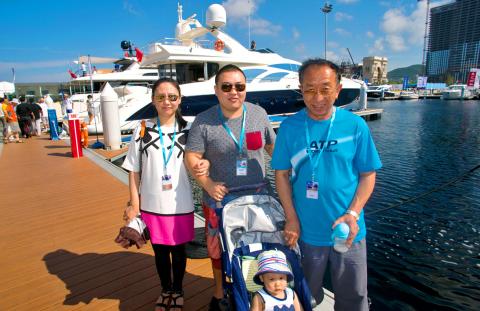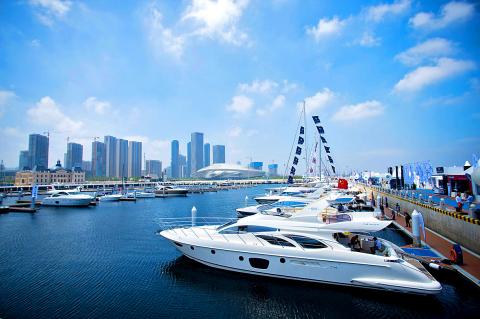With a fortune made in Chinese finance, Li Wang already has six cars, including a Bentley and a Porsche, and his eye on his next multimillionaires’ toy: a boat.
“I only know a little about yachts at the moment,” the 27-year-old said, strolling in golden sunglasses among the sailboats, catamarans and motor cruisers lining the jetties at a boat show in Dalian. “It’s not a big deal. Buying a yacht is on my schedule.”
Li epitomizes the Chinese buyers being targeted by the world’s yachtbuilders, whose vessels can cost as much as US$100 million, taxes not included.

Photo: AFP
Despite its long coastline and 1.35 billion-strong population — including thousands of multimillionaires — China has only an estimated 3,000 pleasure boats, and yachting remains a niche pastime.
In contrast, the US is said to have one watercraft, albeit including small boats, for every 15 inhabitants.
Traugott Kaminski, head of China operations for Italian yachtmaker Sanlorenzo, brought two yachts to China in 2003.

Photo: AFP
“There were no regulations, no port, no yachting culture,” he said, and even now the firm still has to “educate” first-time buyers.
However, others are “sophisticated customers who know what they want,” he said.
“Think about the car industry, 10 or 15 years ago nobody expected China would become the biggest market worldwide and the same thing will happen to the yachting industry,” he said.
In another parallel with the global vehicle business, two major European yachtbuilders — Sunseeker of Britain and Italy’s Ferretti — have been bought by Chinese companies in recent years.
Several thousand visitors attended the event in Dalian, on the shores of the Yellow Sea, and despite the constraints of 43 percent import taxes, limits on infrastructure and bitter northern winters, organizers said that “on-site sales occurred.”
Chinese buyers have different requirements to Westerners, Kaminski said.
“In Europe you will use the boat for a two or three-week cruise,” Kaminski said. “In China, you are using it for a day cruise, so you don’t need so many cabins. You need a big spa; you need entertainment space.”
In the West, the captain and crew are often seen as part of the family. Not so in China, where the wheelhouse and kitchen need to be separate.
Chinese clients also want a round table to eat at, a karaoke machine a mahjong table and more shade.
Marco Valle, sales director for Azimut, one of the world’s major yachtbuilders, remembers the first yacht he sold in China, about a decade ago, to a rich Shanghai businessman.
The client asked if it could be delivered without an engine, as he intended to keep it moored to show off to his contacts.
There are other contrasts.
“The market is really working in reverse,” said Paul Blanc, Asia-Pacific director for boatbuilder Jeanneau, which is targeting China’s upper middle classes, with boats from 5m to 25m, starting from 1.5 million yuan (US$240,000).
“In China we’re starting with big boats and the market is going to expand to smaller sizes,” he said. “In Europe it is the other way round, people start with small boats and as they gain more experience and money, they buy bigger and bigger ones.”
Growth has been rapid, Blanc said, but as well as the import taxes, another major obstacle is a near total absence of public marinas, so that almost all the infrastructure is run by elite private yacht clubs, with memberships costing between 700,000 yuan and 1 million yuan.
Such sums are irrelevant to the buyers of superyachts, said Jona Kan, sales director for Silver Yachts, which specializes in aluminum-hulled vessels more than 70m long.
His firm has only ever sold three ships — two to Middle Eastern buyers and one in the US — but with prices confidential it is still enough to sustain the business.
Now he is looking for an Asian customer.
“Our yachts will be bought by modern Chinese who already have been to all the best hotels in the world and now they want something special to go to places where nobody has been, and with their own accommodation,” he said.
According to an academic paper released last month, the top 1 percent of households in China control more than one-third of its wealth — an illustration of the breadth of social inequality in the communist-ruled country.
Demand for yachts saw a hiccup last year in the face of a much-publicised austerity and anti-corruption drive by Chinese President Xi Jinping (習近平), several vendors said.
However, Kan is targeting customers in a different league, so rich that their money is clean.
“Their wealth is public and is acknowledged by the government,” he said.
They would not need to import their vessel to China, he added. “They can buy it offshore. The boat is built in Australia, but has an Cayman island flag. It’s already an offshore boat.

SEEKING CLARITY: Washington should not adopt measures that create uncertainties for ‘existing semiconductor investments,’ TSMC said referring to its US$165 billion in the US Taiwan Semiconductor Manufacturing Co (TSMC, 台積電) told the US that any future tariffs on Taiwanese semiconductors could reduce demand for chips and derail its pledge to increase its investment in Arizona. “New import restrictions could jeopardize current US leadership in the competitive technology industry and create uncertainties for many committed semiconductor capital projects in the US, including TSMC Arizona’s significant investment plan in Phoenix,” the chipmaker wrote in a letter to the US Department of Commerce. TSMC issued the warning in response to a solicitation for comments by the department on a possible tariff on semiconductor imports by US President Donald Trump’s

‘FAILED EXPORT CONTROLS’: Jensen Huang said that Washington should maximize the speed of AI diffusion, because not doing so would give competitors an advantage Nvidia Corp cofounder and chief executive officer Jensen Huang (黃仁勳) yesterday criticized the US government’s restrictions on exports of artificial intelligence (AI) chips to China, saying that the policy was a failure and would only spur China to accelerate AI development. The export controls gave China the spirit, motivation and government support to accelerate AI development, Huang told reporters at the Computex trade show in Taipei. The competition in China is already intense, given its strong software capabilities, extensive technology ecosystems and work efficiency, he said. “All in all, the export controls were a failure. The facts would suggest it,” he said. “The US

The government has launched a three-pronged strategy to attract local and international talent, aiming to position Taiwan as a new global hub following Nvidia Corp’s announcement that it has chosen Taipei as the site of its Taiwan headquarters. Nvidia cofounder and CEO Jensen Huang (黃仁勳) on Monday last week announced during his keynote speech at the Computex trade show in Taipei that the Nvidia Constellation, the company’s planned Taiwan headquarters, would be located in the Beitou-Shilin Technology Park (北投士林科技園區) in Taipei. Huang’s decision to establish a base in Taiwan is “primarily due to Taiwan’s talent pool and its strength in the semiconductor

French President Emmanuel Macron has expressed gratitude to Hon Hai Precision Industry Co (鴻海精密) for its plan to invest approximately 250 million euros (US$278 million) in a joint venture in France focused on the semiconductor and space industries. On his official X account on Tuesday, Macron thanked Hon Hai, also known globally as Foxconn Technology Group (富士康科技集團), for its investment projects announced at Choose France, a flagship economic summit held on Monday to attract foreign investment. In the post, Macron included a GIF displaying the national flag of the Republic of China (Taiwan), as he did for other foreign investors, including China-based